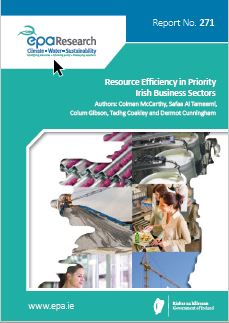Authors: Colman McCarthy, Safaa Al Tameemi, Colum Gibson, Tadhg Coakley and Dermot Cunningham
Summary: The purpose of this desk study was to identify and examine the most important manufacturing and service sectors from environmental and economic perspectives and from the perspective of potential for improvement in resource efficiency.

Resource efficiency is a priority action at both national and European Union (EU) level. Of the 8 billion tonnes of materials used in Europe annually, 1.7 billion tonnes are imported, and 2.6 billion tonnes end up as waste. Fuels accounted for the majority of these imported materials. This highlights the lack of energy independence within Europe and indicates the importance, from a resource efficiency perspective, of moving towards alternative/renewable energy sources. In 2008, the European Commission adopted the Raw Materials Initiative, which set out a strategy for tackling the issue of access to raw materials in the EU. This strategy addresses the fair and sustainable supply of raw materials, as well as supply of “secondary raw materials” through recycling. Although improved resource efficiency has been a primary focus of the EU since 2005, more recently the strategy has evolved towards a circular economy approach. This incorporates previous material efficiency strategies as well as “systems thinking” and use of renewable energy and establishes that prices should reflect real costs.
If Ireland were to achieve a 2% reduction in domestic material consumption per annum, while still maintaining GDP in line with growth predictions, this would yield savings of approximately €900 million in the first year, with increased annual savings thereafter. Following analysis of all of the available environmental and economic parameters, the project team has identified six priority manufacturing and services sectors as being the most significant to Ireland from a resource use perspective. Three are manufacturing sectors (food and beverages, pharmaceuticals and chemicals and non-metallic mineral products) and three are services sectors (construction, retail and accommodation and food services), with construction considered a service rather than a manufacturing process. Based on the research, a number of recommendations have been made. These relate initially to the individual sectors listed above (in the form of factsheets) but also to resource efficiency in Ireland in general and to improved data gathering and analysis.
https://www.epa.ie/media/epa-2020/publications/research/Research_271_Thumbnail[1].jpg